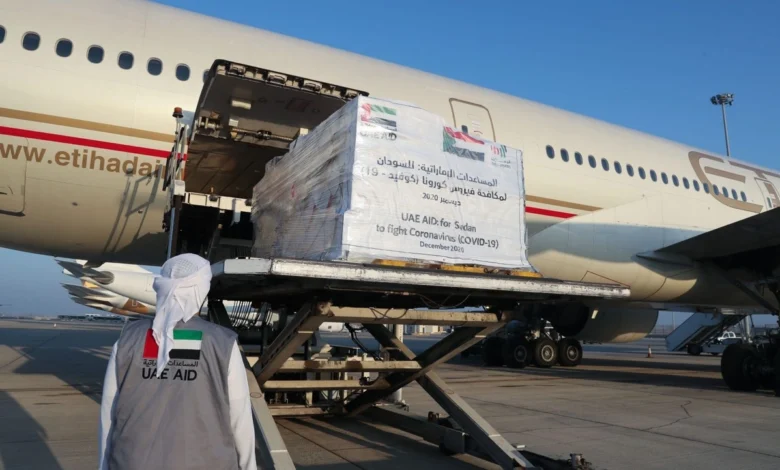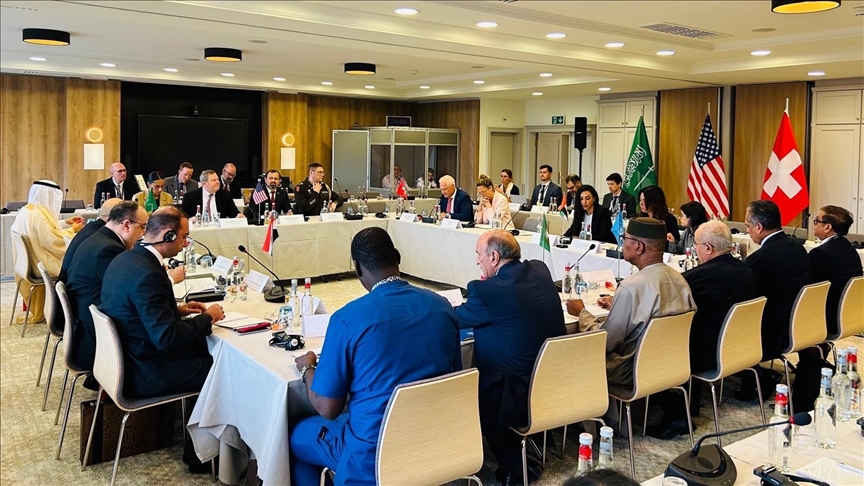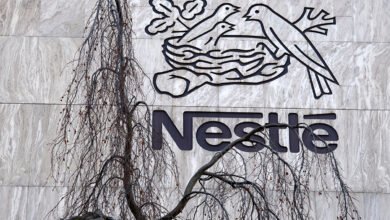
UAE Condemns Sudan Violence, Announces Major Relief Fund
UAE has condemned ‘heinous attacks’ in Sudan’s Al Fasher while announcing most important relief efforts as the devastating conflict enters its third year. The war between the Sudanese Armed Forces (SAF) and the Rapid Support Forces (RSF) began in April 2023. It has killed tens of thousands and forced at least 13 million people to flee their homes. The crisis has left about 30 million people—more than half of Sudan’s population—facing hunger, and some areas in Darfur now face famine.
The UAE has taken a strong position against the violence and works closely with the UN on relief initiatives to address this worsening humanitarian crisis. Emirati officials have promised substantial support, though challenging weather could hamper aid delivery in the next 10 days. Reports from UAE’s The National show the conflict has deeply hurt Sudan’s economy, with gold making up about 49% of the country’s exports. The international community and the UAE now see an urgent need to step in and prevent the situation from getting worse.
UAE Condemns El Fasher Attacks and Calls for Accountability
Image Source: Reuters
“The United Arab Emirates condemns the heinous attacks against civilians in El Fasher, in blatant violation of international humanitarian law. We call on the RSF to ensure the protection of civilians and humanitarian personnel. We call on the international community to ensure that all perpetrators of atrocities are held to account.” — HE Mohamed Abushahab, Ambassador and Permanent Representative of the United Arab Emirates to the United Nations
The UAE delivered a strong statement at the UN Security Council about Sudan’s violence. Ambassador Mohamed Abushahab condemned the “heinous attacks against civilians in El Fasher” as a clear violation of international humanitarian law. He directly asked the Rapid Support Forces (RSF) to protect civilians and humanitarian workers in the conflict zone.
The UAE called on the international community to act decisively against those responsible for these attacks. This statement followed UN Human Rights Office reports about RSF atrocities, which included summary executions after they took control of large parts of El Fasher.
The UAE’s position demanded both the Sudanese Armed Forces (SAF) and RSF to show restraint and stop targeting civilians while following International Humanitarian Law. Their compliance should include safe humanitarian corridors and unrestricted aid delivery.
RSF commander Gen Mohamed Dagalo later admitted his forces’ “abuses” in a video broadcast. The UAE has stood firm on its position that Sudan’s future government should exclude both the army and RSF. The country believes that “the only viable solution lies in a genuine transitional process—one that guides to an independent civilian-led government”.
UAE Pledges $100 Million in Humanitarian Aid to Sudan
Image Source: Daily Sabah
“Today we are announcing an additional $100 million USD to support life-saving humanitarian operations in El Fasher.” — HE Mohamed Abushahab, Ambassador and Permanent Representative of the United Arab Emirates to the United Nations
Dr. Anwar Mohammed Gargash, Diplomatic Adviser to the UAE President, announced a $100 million (AED 367.19 million) humanitarian aid package for Sudan at the IISS Manama Dialog Forum 2025. This financial support will help people in regions of all sizes across Sudan, with special focus on El Fasher and other conflict-affected areas.
The Emirates Red Crescent, World Food Program, and other international humanitarian organizations will distribute this aid. Gargash highlighted UAE’s increased humanitarian efforts through field hospitals in Chad and South Sudan. He stressed the need for unhindered aid delivery to those who need it most.
UAE’s latest contribution builds on its long-standing support for Sudan. The country has given AED 12.85 billion in humanitarian assistance to the Sudanese people in the last decade. Since the current conflict began, UAE has provided AED 2204.63 million in aid. This includes an earlier pledge of AED 734.39 million made at the High-Level Pledging Event in Addis Ababa in February 2024.
UAE has sent 162 aid flights through a dedicated air bridge, delivering 13,168 tons of food, medicine, and emergency supplies. More than two million Sudanese people have directly benefited from this aid. The support extends to refugees in neighboring countries like Chad, Uganda, and South Sudan.
Quad Nations Push for Ceasefire and Civilian Transition

Image Source: Anadolu Ajansı
The United States, Saudi Arabia, Egypt, and the UAE—known as the Quad—have put forward a detailed peace plan for Sudan. These nations met at the US’s request, where their ministers laid out a roadmap that starts with a three-month humanitarian truce and leads to a permanent ceasefire.
The ministers’ plan outlines a nine-month political process to set up an independent, civilian-led government that would have broad public support. The ministers stressed that Sudan’s future governance “is for the Sudanese people to decide through an inclusive and transparent transition process, not controlled by any warring party”.
The military-aligned government in Sudan rejected this proposal. They claimed that “the realization of peace in Sudan is the responsibility of the people of Sudan alone”. Sudan’s de facto ruler, General Abdel Fattah Al Burhan, insists he will continue the war until the RSF surrenders.
Sudan’s sovereignty and territorial integrity remain crucial to peace, according to the Quad, which rules out any military solution to the conflict. The ministers will track implementation timelines closely and work to ensure both parties comply.
The plan, which emerged on September 12, 2025, clearly states that Sudan’s future “cannot be dictated by violent extremist groups part of or evidently linked to the Muslim brotherhood”. The Quad members will meet again in September 2025 to continue their discussions.
The brutal conflict in Sudan has entered its third year, taking a terrible toll on its people. Of course, millions remain displaced while more than half the population faces severe hunger. The UAE strongly condemned the “heinous attacks” in El Fasher, showing their dedication to humanitarian principles. Their $100 million aid package provides real help to those who need it most.
Aid alone won’t solve this complex crisis. The Quad nations’ diplomatic efforts offer another path forward, but Sudan’s military government has rejected the proposed peace plan – a major setback. The UAE stands firm that neither warring side should control Sudan’s future. Instead, they support an independent civilian-led transition.
The UAE has shown its regional leadership through a decade of support to Sudan, with contributions reaching over AED 12.85 billion. Their clear demands for accountability send a strong message against those who commit atrocities during the conflict. At the UN Security Council, Ambassador Abushahab reinforced UAE’s commitment to international humanitarian law.
Bad weather might slow down aid delivery for now. The air bridge and multiple distribution channels prove UAE’s careful planning can overcome these obstacles. The ongoing partnership between UAE and international organizations helps reach vulnerable people in conflict zones.
Sudan faces a defining moment in its history. Regional powers like UAE and international partners bring hope to this devastating situation. Peace will come only when both sides show restraint, allow aid to flow freely, and work toward an inclusive political process that truly reflects what the Sudanese people want for their future.






